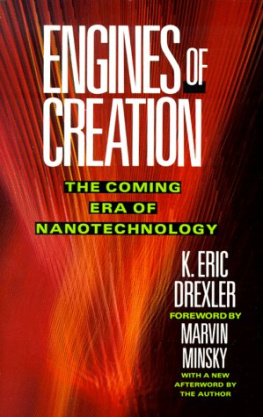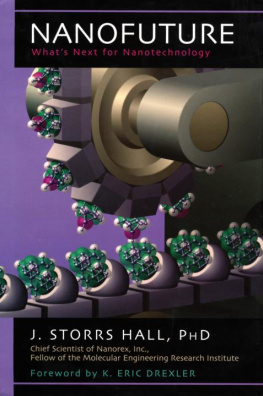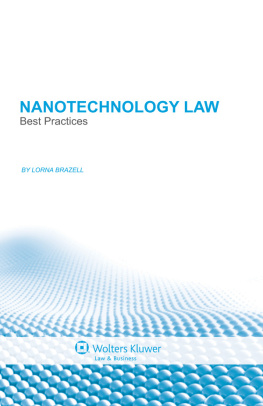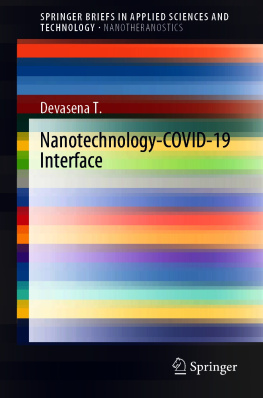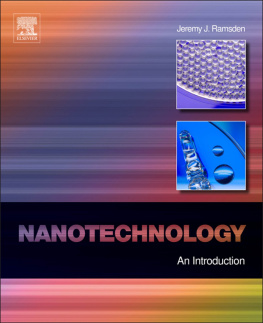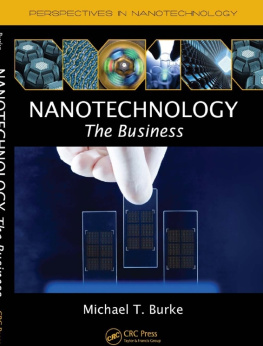K. Eric Drexler - Engines of Creation - The Coming Era of Nanotechnology
Here you can read online K. Eric Drexler - Engines of Creation - The Coming Era of Nanotechnology full text of the book (entire story) in english for free. Download pdf and epub, get meaning, cover and reviews about this ebook. City: New York, year: 1986, publisher: Anchor Books, genre: Romance novel. Description of the work, (preface) as well as reviews are available. Best literature library LitArk.com created for fans of good reading and offers a wide selection of genres:
Romance novel
Science fiction
Adventure
Detective
Science
History
Home and family
Prose
Art
Politics
Computer
Non-fiction
Religion
Business
Children
Humor
Choose a favorite category and find really read worthwhile books. Enjoy immersion in the world of imagination, feel the emotions of the characters or learn something new for yourself, make an fascinating discovery.
- Book:Engines of Creation - The Coming Era of Nanotechnology
- Author:
- Publisher:Anchor Books
- Genre:
- Year:1986
- City:New York
- Rating:5 / 5
- Favourites:Add to favourites
- Your mark:
- 100
- 1
- 2
- 3
- 4
- 5
Engines of Creation - The Coming Era of Nanotechnology: summary, description and annotation
We offer to read an annotation, description, summary or preface (depends on what the author of the book "Engines of Creation - The Coming Era of Nanotechnology" wrote himself). If you haven't found the necessary information about the book — write in the comments, we will try to find it.
Engines of Creation - The Coming Era of Nanotechnology — read online for free the complete book (whole text) full work
Below is the text of the book, divided by pages. System saving the place of the last page read, allows you to conveniently read the book "Engines of Creation - The Coming Era of Nanotechnology" online for free, without having to search again every time where you left off. Put a bookmark, and you can go to the page where you finished reading at any time.
Font size:
Interval:
Bookmark:
FOREWORD by Marvin Minsky |
K. Eric Drexler's Engines of Creation is an enormously original book about the consequences of new technologies. It is ambitious and imaginative and, best of all, the thinking is technically sound.
But how can anyone predict where ? Granted, some of those writers knew a great deal about the science of their times. But perhaps the strongest source of their success was that they were equally concerned with the pressures and choices they imagined emerging from their societies. For, as Clarke himself has emphasized, it is virtually impossible to predict the details of future technologies for more than perhaps half a century ahead. For one thing, it is virtually impossible to predict in detail which alternatives will become technically feasible over any longer interval of time. Why? Simply because if one could see ahead that clearly, one could probably accomplish those things in much less time - given the will to do so. A second problem is that it is equally hard to guess the character of the social changes likely to intervene. Given such uncertainty, looking ahead is like building a very tall and slender tower of reasoning. And we all know that such constructions are untrustworthy.
How could one build a sounder case? First, the foundations must be very firm - and Drexler has built on the soundest areas of present-day technical knowledge. Next, one must support each important conclusion step in several different ways, before one starts the next. This is because no single reason can be robust enough to stand before so many unknowns. Accordingly, Drexler gives us multiple supports for each important argument. Finally, it is never entirely safe to trust one's own judgments in such matters, since all of us have wishes and fears which bias how we think - without our knowing it. But, unlike most iconoclasts, Drexler has for many years courageously and openly exposed these ideas to both the most conservative skeptics and the most wishful-thinking dreamers among serious scientific communities like the one around MIT. He has always listened carefully to what the others said, and sometimes changed his views accordingly.
Engines of Creation begins with the insight that what we can do depends on what we can build. This leads to a careful analysis of possible ways to stack . Then Drexler asks, "What could we build with those atom-stacking mechanisms?" For one thing, we could manufacture assembly machines much smaller even than living cells, and make materials stronger and lighter than any available today. Hence, better spacecraft. Hence, tiny devices that can travel along capillaries to enter and repair living cells. Hence, the ability to heal disease, reverse the ravages of age, or make our bodies speedier or stronger than before. And we could make machines down to the size of viruses, machines that would work at speeds which none of us can yet appreciate. And then, once we learned how to do it, we would have the option of assembling these myriads of tiny parts into intelligent machines, perhaps based on the use of trillions of nanoscopic parallel-processing devices which make descriptions, compare them to recorded patterns, and then exploit the memories of all their previous experiments. Thus those new technologies could change not merely the materials and means we use to shape our physical environment, but also the activities we would then be able to pursue inside whichever kind of world we make.
Now, if we return to Arthur C. Clarke's problem of predicting more than fifty years ahead, we see that the topics Drexler treats make this seem almost moot. For once that atom-stacking process starts, then "only fifty years" could bring more change than all that had come about since near-medieval times. For, it seems to me, in spite of all we hear about modern technological revolutions, they really haven't made such large differences in our lives over the past half century. Did television really change our world? Surely less than radio did, and even less than the telephone did. What about airplanes? They merely reduced travel times from days to hours - whereas the railroad and automobile had already made a larger change by shortening those travel times from weeks to days! But Engines of Creation sets us on the threshold of genuinely significant changes; could have more effect on our material existence than those last two great inventions in that domain - the replacement of sticks and stones by metals and cements and the harnessing of electricity. Similarly, we can compare the possible effects of artificial intelligence on how we think - and on how we might come to think about ourselves - with only two earlier inventions: those of language and of writing.
We'll soon have to face some of these prospects and options. How should we proceed to deal with them? Engines of Creation explains how these new alternatives could be directed toward many of our most vital human concerns: toward wealth or poverty, health or sickness, peace or war. And Drexler offers no mere neutral catalog of possibilities, but a multitude of ideas and proposals for how one might start to evaluate them. Engines of Creation is the best attempt so far to prepare us to think of what we might become, should we persist in making new technologies.
MARVIN MINSKY
Donner Professor of Science
Massachusetts Institute of Technology
(Chapter 1)
| Protein engineering ... represents the first major step toward a more general capability for molecular engineering which would allow us to structure matter atom by atom.
|
COAL AND DIAMONDS, sand and have distinguished the cheap from the cherished, the diseased from the healthy. Arranged one way, atoms make up soil, air, and water; arranged another, they make up ripe strawberries. Arranged one way, they make up homes and fresh air; arranged another, they make up ash and smoke.
Our ability to arrange atoms lies at the foundation of technology. We have come far in our atom arranging, from chipping flint for arrowheads to machining aluminum for spaceships. We take pride in our technology, with our lifesaving drugs and desktop computers. Yet our spacecraft are still crude, our computers are still stupid, and the molecules in our tissues still slide into disorder, first destroying health, then life itself. For all our advances in arranging atoms, we still use primitive methods. With our present technology, we are still forced to handle atoms in unruly herds.
But the laws of nature leave plenty of room for progress, and the pressures of world competition are even now pushing us forward. For better or for worse, the greatest technological breakthrough in history is still to come.
Our modern technology builds on an ancient tradition. Thirty thousand years ago, chipping flint was the high technology of the day. Our ancestors grasped stones containing trillions of trillions of atoms and removed chips containing billions of trillions of atoms to make their axheads; they made fine work with skills difficult to imitate today. They also made patterns on cave walls in France with sprayed paint, using their hands as stencils. Later they made pots by baking clay, then bronze by cooking rocks. They shaped bronze by pounding it. They made iron, then steel, and shaped it by heating, pounding, and removing chips.
We now cook up pure ceramics and stronger steels, but we still shape them by pounding, chipping, and so forth. We cook up pure silicon, saw it into slices, and make patterns on its surface using tiny stencils and sprays of light. We call the products "chips" and we consider them exquisitely small, at least in comparison to axheads.
Font size:
Interval:
Bookmark:
Similar books «Engines of Creation - The Coming Era of Nanotechnology»
Look at similar books to Engines of Creation - The Coming Era of Nanotechnology. We have selected literature similar in name and meaning in the hope of providing readers with more options to find new, interesting, not yet read works.
Discussion, reviews of the book Engines of Creation - The Coming Era of Nanotechnology and just readers' own opinions. Leave your comments, write what you think about the work, its meaning or the main characters. Specify what exactly you liked and what you didn't like, and why you think so.

